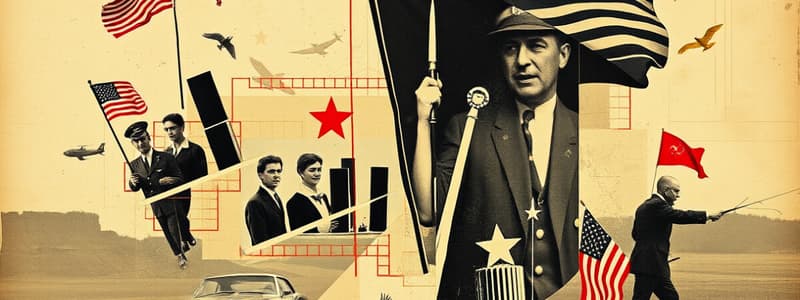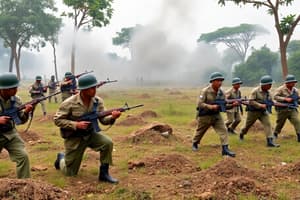Podcast
Questions and Answers
What does the domino theory refer to?
What does the domino theory refer to?
- A theory that justifies military intervention in foreign countries (correct)
- A policy of checking the expansion of communism (correct)
- The impact of Soviet influence on neighboring countries
- None of the above
What are satellite states?
What are satellite states?
Countries that were formally independent but are now influenced politically and economically by another country.
What is the Iron Curtain?
What is the Iron Curtain?
A political, military, and ideological barrier erected by the Soviet Union after World War II.
What did the Truman Doctrine declare?
What did the Truman Doctrine declare?
What was the Marshall Plan?
What was the Marshall Plan?
What triggered the Berlin Blockade?
What triggered the Berlin Blockade?
What is NATO?
What is NATO?
What is containment?
What is containment?
Flashcards are hidden until you start studying
Study Notes
Domino Theory
- A U.S. foreign policy principle emerging after WWII, suggesting that the fall of a noncommunist state to communism would trigger similar falls in neighboring countries.
- Proposed by President Harry S. Truman regarding military aid to Greece and Turkey in the late 1940s.
- Gained traction in the 1950s through President Dwight D. Eisenhower’s application to Southeast Asia, notably South Vietnam.
- Central to justifying U.S. military involvement during the Vietnam War under Presidents Kennedy and Johnson.
Satellite States
- Refers to countries that were formerly independent but are now politically and economically dominated by another country.
- Commonly used to describe the nations under the influence of the Soviet Union, known as Soviet Satellite States or the Eastern Bloc.
Iron Curtain
- A metaphorical barrier established by the Soviet Union post-WWII, separating its Eastern European allies from the Western world and noncommunist nations.
- Prominently referenced by Winston Churchill in a 1946 speech, highlighting the division across Europe from Stettin to Trieste.
Truman Doctrine
- Announced by President Harry S. Truman on March 12, 1947, to provide immediate U.S. economic and military assistance to Greece and Turkey.
- Aimed to counter potential communist insurrections and Soviet influence, particularly after Britain withdrew support due to financial struggles.
- Promptly led the U.S. Congress to allocate $400 million for these efforts.
Marshall Plan
- Officially known as the European Recovery Program, initiated from April 1948 to December 1951.
- A U.S.-sponsored initiative aimed at revitalizing the economies of 17 western and southern European countries to foster stable democratic conditions.
Berlin Blockade and Airlift
- An international crisis from 1948-49 initiated by the Soviet Union to challenge Western Allied presence in West Berlin.
- Following the Allied powers' decision to unify their occupational zones, the Soviets imposed a blockade blocking all transport routes to West Berlin in response to the introduction of a new currency.
- The U.S. and Britain launched an airlift starting June 26, 1948, delivering vital supplies to West Berlin while increasing military presence.
- Tensions escalated without resulting in direct conflict.
NATO
- The North Atlantic Treaty Organization, formed on April 4, 1949, as a military alliance to counter the Soviet military threat in Central and Eastern Europe.
Containment
- A strategic foreign policy adopted by the United States in the late 1940s and early 1950s, designed to prevent the spread of Soviet communism and influence globally.
Studying That Suits You
Use AI to generate personalized quizzes and flashcards to suit your learning preferences.




